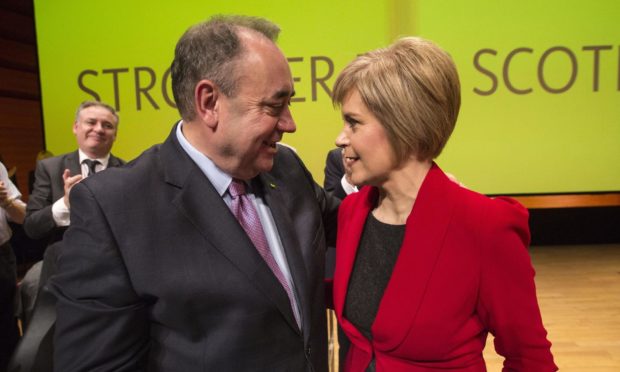Finding a diversion from coronavirus has been no problem for keen news junkies during the last couple of weeks. Two heavyweight battles have provided plenty of material for those of us who like to keep abreast of what’s happening at home and abroad.
Two battles seemingly unconnected, a million miles away from each other in terms of subject matter and yet joined together by one irrefutable fact – they are battles in which all the combatants could end up on the losing side.
The long-awaited appearance of former first minister Alex Salmond and his successor, current First Minister Nicola Sturgeon, before the committee investigating the shambolic handling of the investigation into harassment complaints against Mr Salmond lived up to the pre-match hype, and the general consensus appears to be that the match ended in a scoreless draw.
Both demonstrated why they are two of the most highly-regarded politicians in modern times – answering questions clearly, coolly and with apparent honesty, Mr Salmond for six hours and Ms Sturgeon for eight. Yet, scratching beneath the surface of their supremely polished performances, Mr Salmond failed to land a telling blow on the woman he is clearly determined to bring down, and Ms Sturgeon could not quite dispel the widely held belief that what we have heard so far falls somewhat short of the truth, the whole truth and nothing but the truth.
The committee will now tie up a few loose ends before considering the evidence it has heard and delivering its verdict some time before Scotland goes to the polls on May 6.
It became quite clear from the nature of the questioning that the verdict, when it comes, will be more reflective of the committee’s political affiliations than the reality of the mess they have been asked to unravel. It was not difficult to distinguish between the SNP members and the opposition simply by the way in which their questions were framed. Add to that a convenor who apparently found the task more difficult than she had expected, and it is difficult to imagine anything earth-shattering emerging from their deliberations.
Whatever the outcome, however, it appears that neither Mr Salmond nor Ms Sturgeon will emerge from this victorious. Yes, the verdict will come down in favour of one or the other, but there are already clear signs that the real loser will be the nationalist movement and, with it, the independence cause.
Two opinion polls on Sunday showed that support for separation has fallen below 50% for the first time for many, many months and the outcome of May’s Holyrood elections will no longer be the landslide SNP victory previously taken as a given. Whatever actually happens, the question I cannot rationalise is this – what has Alex Salmond achieved, given that he is seen by many as the man who turned independence from a pipedream into a realistic proposition? Personal vindication? Possibly. Revenge against the woman he accuses of throwing him to the wolves? Certainly. Progress along Scotland’s road to independence? Definitely not.
The supporting bout in this is the increasingly acrimonious dispute between the Queen in the blue corner and her grandson, Prince Harry and wife Meghan in the red corner. The fallout from the Sussexes’ two-hour TV interview with Oprah Winfrey is very much in its infancy because both sides are now settling in for a long, drawn-out war of attrition. What Harry and Meghan appear to have overlooked is that they cannot possibly win. Sure, public opinion may fall behind them as they play each of their aces – the suffocating nature of life within the royal family, the effect on their mental health of the media intrusion they claim to have endured and, when all else fails, their joker card – racism. But they are about to discover, with devastating effect, that media coverage is not a tap which can be turned on and off. They claim that their decision to relocate to America was influenced by a desire for privacy. Opening themselves up to a no-holds-barred TV interview will shatter that dream. As Harry’s mother would testify were she alive today.
From the Queen’s perspective, she has already lost. The royal family – the Firm – which she has jealously protected during nearly 70 years on the throne, has been further damaged by a row which brings into question its relevance in 21st-Century Britain.
Derek Tucker is a former editor of The Press and Journal.
